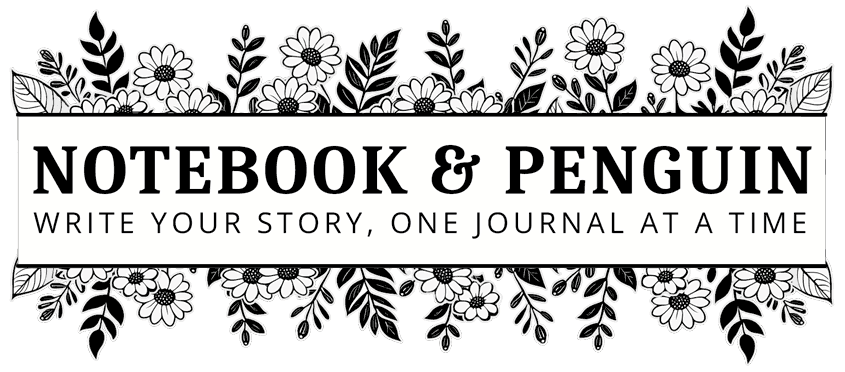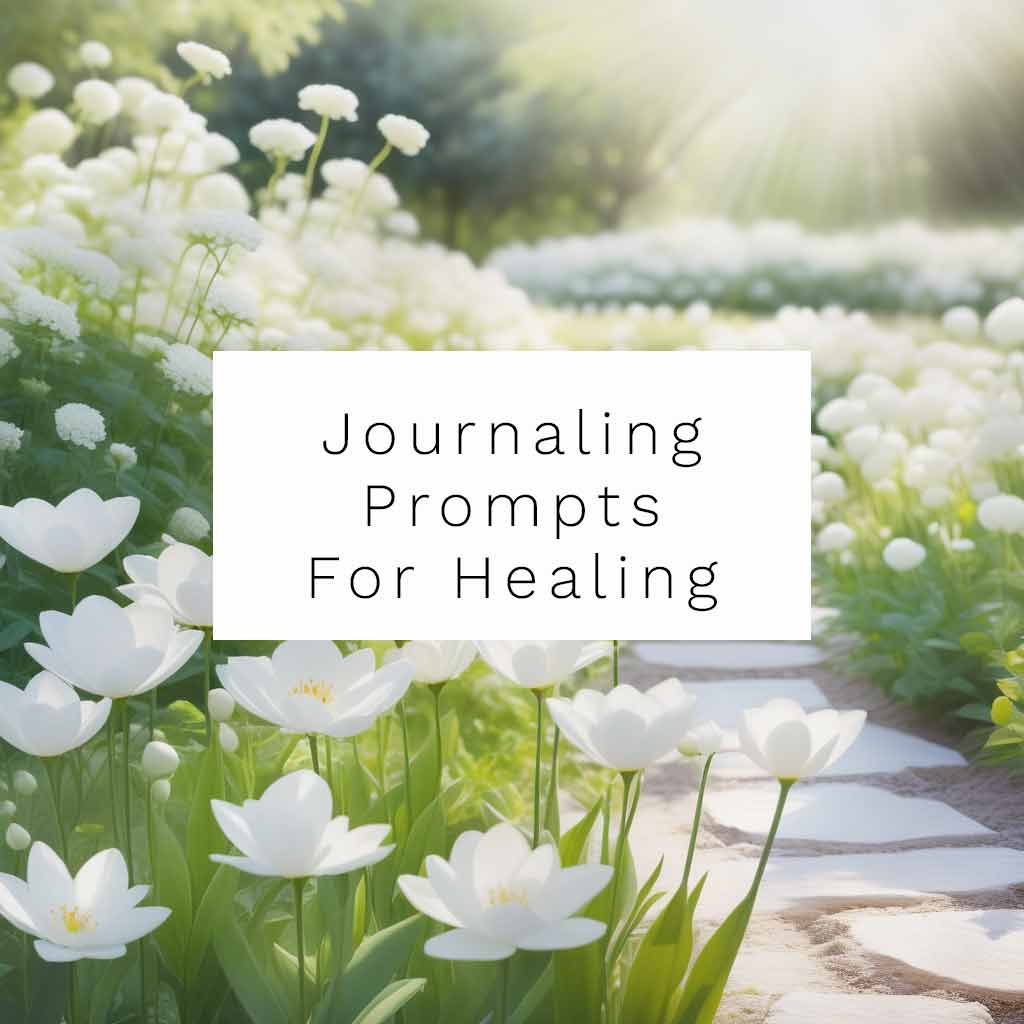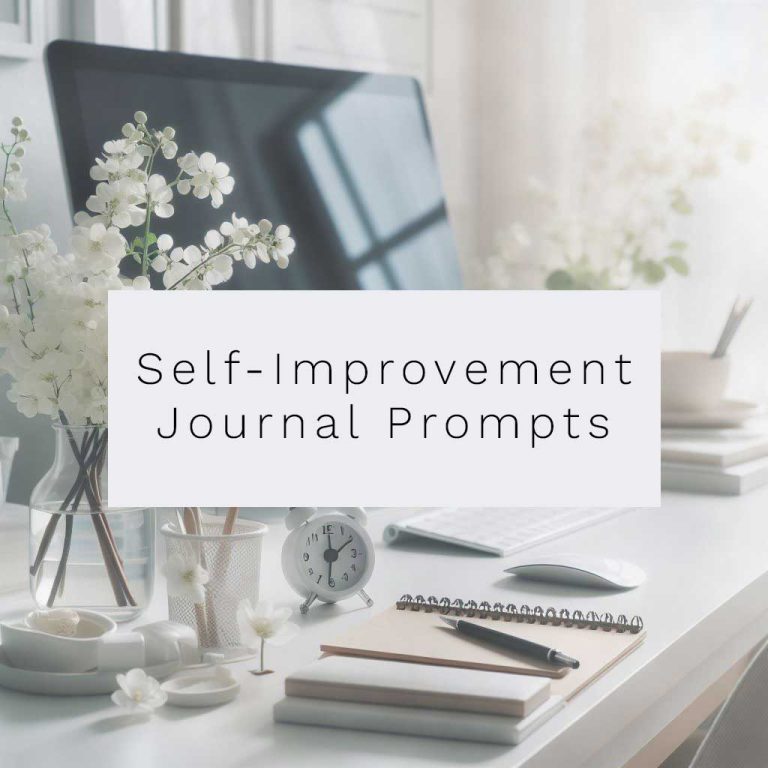

75 Journal Prompts For Healing After Traumatic & Painful Experiences
Pain and trauma can have a huge impact on our lives, affecting both our physical and mental health, our relationships, and our overall well-being. It can leave you feeling anxious or depressed, overwhelmed, and sometimes even hopeless. It can sometimes feel like you are stuck in a never-ending cycle of negativity and self-doubt. But all is not lost! With the right tools and support it is possible to heal and move forward.
In this article, I’ve put together 75 journal prompts for healing trauma and pain. These journaling prompts are designed to help you reflect on your experiences and identify patterns or triggers that affect you.
They can help you to find your voice, assert yourself, and set healthy boundaries. They will also help you to develop coping strategies to manage your stress and emotions and ultimately I hope they will give you a renewed sense of purpose and meaning in your life which will lead you towards healing and growth.
Remember, healing is a journey and it’s okay to take it one step at a time. Keep writing, keep reflecting, and most importantly, keep moving forward. You got this!
Prompts To Help You Reflect On The Trauma
- What are the memories that still haunt you?
- What are the areas in your life where you feel the most hurt or wounded?
- Create a list of emotions that you struggle with the most.
- What physical sensations do you experience when you think about the traumatic event?
- Are there any thoughts that you can’t seem to shake off?
- Have you talked to anyone about the trauma? If so, who and how did it go?
- How have your relationships been affected since the traumatic event?
- What do you think was the most difficult part of your experience for you?
- How did your experience change your perspective on life?
- What do you think you learned from your experience?
- What do you think your experience has taught you about yourself?
- What do you think is the most important thing for people to understand about your experience?
- Imagine that you are a therapist and write therapy session notes about your own trauma.
Exploring Coping Mechanisms
- What are some patterns or habits that you’ve developed to cope with pain or stress?
- Create a list of positive affirmations that you can use to counteract those negative beliefs.
- What are some grounding techniques that you use to bring yourself back to the present moment?
- Write about a time when you felt overwhelmed by your emotions and how you managed to cope.
- Write about a time when you felt anxious or scared and how you managed to calm yourself down.
- Describe a time when you felt angry or resentful and how you expressed those emotions in a healthy way.
- What coping mechanisms have you developed since your experience? Do you think that these coping mechanisms are healthy or unhealthy?
- Think about any unhealthy coping mechanisms you would like to replace. What alternatives can you introduce?
- Create a list of activities that bring you joy and relaxation. How can you incorporate them more regularly into your routine?
- Describe healthy boundaries you want to establish in your personal and professional life.
- Write about a time when you set boundaries with someone who was toxic or abusive.
- Create a list of things in your life that give you a sense of safety and stability.
- Reflect on your relationship with substances (e.g., alcohol, drugs) and how it may be related to the trauma.
- Create a list of things that you can do to distract yourself from negative thoughts and feelings.
- When you feel anxious or upset, what can you do to help calm yourself down?
- Create a list of things you can do to feel more connected to your body and your surroundings, e.g., going for a walk.
Exploring Negative Beliefs and Thoughts
- What are some negative beliefs or thoughts that you have about yourself because of the trauma and pain you have experienced?
- Go through the list of negative beliefs you have about yourself, are any of these beliefs really truthful or honest?
- What are some common thoughts or emotions that you experience when you think about your experience?
- Do you feel guilt? If so, create a list of things that you feel guilty about.
- Do you feel ashamed? If so, create a list of things that you feel ashamed about.
- Do you feel angry? If so, create a list of things you feel angry about.
- Do you feel sad? If so, create a list of things that you feel sad about.
- Do you feel scared? If so, create a list of things that you feel scared about.
- Do you feel hopeless? If so, create a list of things you feel hopeless about.
- Write a letter to your younger self during the time of the trauma. What advice and comfort would you offer?
- Write about a recent nightmare or flashback you had and how it made you feel.
Reflecting on Loss and Grief
- Create a list of things that you used to enjoy doing but no longer do.
- From the list, which items do you wish you could do again but feel unable to?
- Write about a time when you felt sad or depressed and how you took care of yourself.
- Write about a time when you felt hopeful or optimistic about your future.
- Make a list of things that you are grateful for in your life, despite difficult times and bad days.
Exploring Anger and Boundaries
- Express your anger in a letter. What boundaries were violated, and how can you protect them now?
- Create a list of things that make you angry about your experience.
- Write about a time when you were able to set boundaries with someone who was toxic or abusive.
- Write about a time when you felt angry or resentful and how you expressed those emotions in a healthy way.
- Describe a time when you felt triggered and how you coped with it.
Self-care and Mindfulness
- Create a list of things that you did well or feel proud of after your experience.
- Create a list of things you’re proud of yourself for, despite challenges or setbacks.
- What are some ways that you can show compassion and kindness to yourself, even when you feel like you’re struggling?
- Create a list of things that you are grateful for in your relationships, even in the midst of conflict or challenge.
- Write about a time when you were able to forgive yourself or someone else for a past hurt.
- Write about a time when you were able to use your experience to help someone else.
- Write about a time when you were able to find meaning or purpose in the trauma.
Prompts for Reflection and Growth
- What do you think was the most unexpected part of your experience?
- How do you think your experience has affected your mental health?
- Has your experience affected your physical health?
- What do you think is the most difficult thing for people to understand about your experience?
- How do you think society’s expectations and norms impact how you respond to your pain and trauma?
- Think about ways that you can either rebuild or strengthen trust in your relationships. How can you connect with others and build support?
- Create a list of things that you feel will give you more control and stability in your life.
- What are some things that you’re afraid to say or express to someone you care about?
Even in difficult times, it is important to remember to be grateful, even if it’s just for the small things we have in our lives. If you need help getting started, check out this giant list of gratitude journaling prompts that you can begin using right away!
Healing Prompts To Help You Move Forward
- What do you think you learned from your experience?
- How do you think your experience has changed you?
- If you could go back in time, is there anything you would do differently? How would these changes impact your life and the lives of the people around you today?
- What are some things that you’re excited about or looking forward to in your life?
- What are some things that you’re afraid to confront or face, and why?
- What are some things that you’ve been avoiding or procrastinating on, and why?
Journal Prompts For Healing, Forgiveness and Letting Go
- Write a letter to someone who has hurt you, even if you don’t intend to send it. What do you need to let go of?
- What are some things that you’ve been carrying around for a long time that you’re ready to let go of?
- What are some things that you’re holding onto from past relationships that you need to release?
- What are some ways that you can take responsibility for your part in a difficult situation, and make amends if necessary?
Conclusion
Journaling is a powerful way to work on healing when you have gone through a traumatic or painful experience. I hope that these healing prompts have helped you to work through some of the difficult emotions you may be going through.


